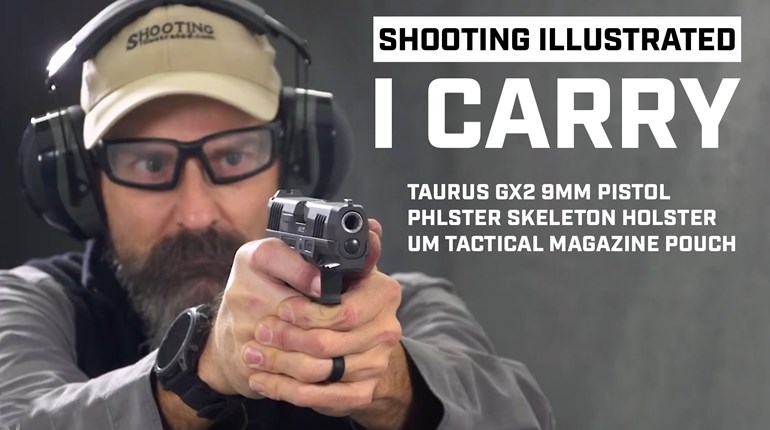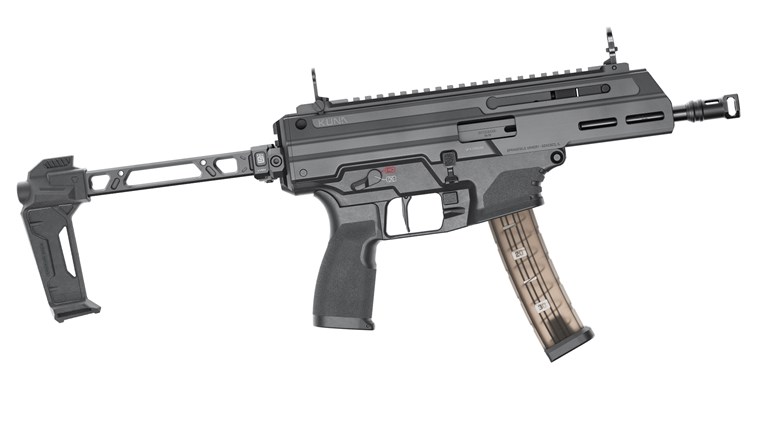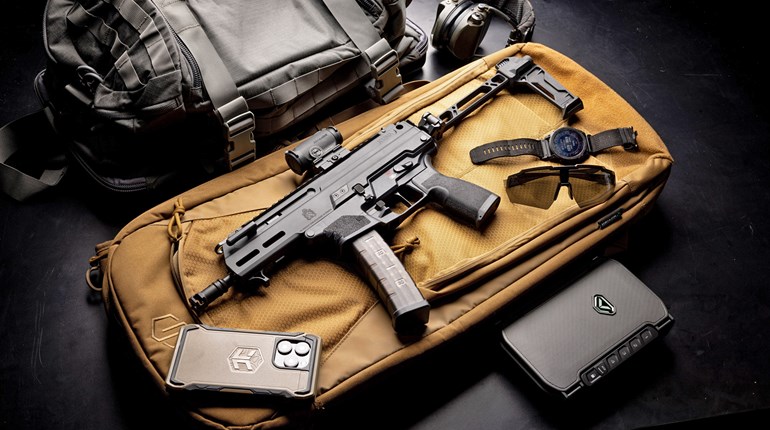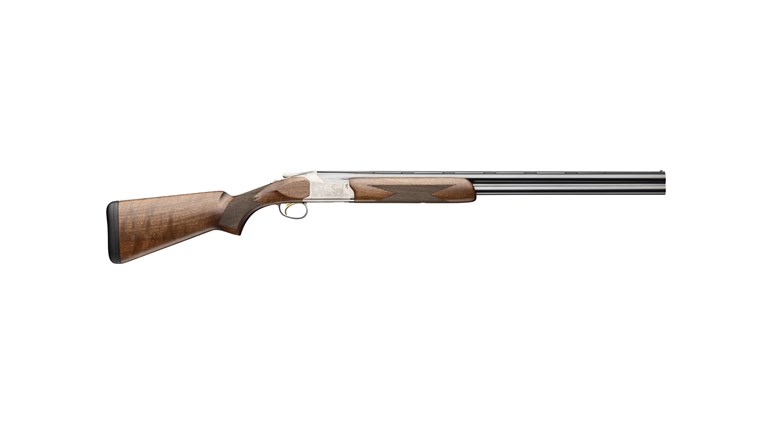
Kits are cool. The very existence of a kit suggests you have put some serious thought into an issue, prepared a plan of action, and prepackaged the necessary tools to carry out that plan. Or, in the case of the XD(M) 3.8 Compact pistol, Springfield Armory did your thinking for you, determined what you would need to get through the anticipated crisis, and prepared a kit of key supplies you could simply grab when the need arose. Let's back up.
The XD(M) 3.8 Compact is Springfield Armory's latest version of the XD pistol, but with additional features as indicated by the (M) which stands for "more." It's a polymer frame, locked-breach, recoil-operated, striker-fired semi-automatic pistol. The 3.8 indicates the gun's barrel length of 3.8 inches. These general characteristics are common to many of today's polymer pistols, but Springfield has gone the extra mile on the 3.8 Compact both internally and externally. There is a loaded-chamber indicator and a striker-status indicator, both of which enable you to confirm status visually or tactilely. The magazine release is ambidextrous, and there is a grip safety, but no thumb safety. The gun can't be fired until the proper grip has been obtained with the shooting hand (depressing the grip safety) and the trigger is pulled. Depressing the grip safety allows the trigger to be pulled and releases the slide block, and pulling the trigger clears the other internal safeties. There is no manual of arms to perform before defending yourself; just grip the pistol, obtain a sight picture and press the trigger. Yet, without the proper grip, you can't even operate the slide to chamber a round thanks to the grip safety. Springfield calls this the Ultra Safety Assurance (USA) lockwork.
I was impressed with the triggers on the two XD(M) 3.8s I tested, and I'm not a fan of triggers on striker-fired guns. On the .40 S&W, trigger pull ran slightly more than 6 pounds while the 9 mm was right at 7 pounds. The difference felt greater because the .40's trigger seemed considerably smoother. Even more noticeable was the short, distinct trigger reset.
I'm notoriously sloppy during rapid fire of any semi-automatic—letting my trigger finger flop everywhere between shots—but firing the XD(M) 3.8s, I was very aware of the triggers resetting after a very short forward movement. Under stress, it's likely I would resort to my well-developed bad habits, but the XD's crisp reset should prove a big help to shooters trying to shoot fast and build good habits. When making precise, longer-range shots at a more leisurely pace, I found the smooth triggers very beneficial.
Earlier Springfield XD models have a different-shaped slide than the newer XD(M)s. They're wider at the bottom of the slide, with a distinct reduction in width about halfway toward the top. The new slides have a slightly trapezoidal shape being narrower at the top, but without the distinct step. With the angled serrations on the front and rear of the new slides, it's much easier to perform a chamber check.
Grip shape and texture of the new model grip frame is also much improved. Instead of the smaller-size checkering and stippled-like surface, the newer grips have large waffle-shaped sections that facilitate controlling the gun during firing. This made a noticeable difference when stepping up from the 9 mm to the .40 S&W. Also, both sides of the grip have been dished out where the trigger finger enters the trigger guard. Whether shooting right or left handed, I liked the increased clearance between trigger finger and frame.
Getting back to that "cool kit" thing, Springfield XDs and XD(M)s come in a lockable plastic case, like most handgun boxes in which new guns are delivered these days. The distinction is the Springfield box contains a complete kit. In addition to extra magazines, there is a holster, a double-magazine pouch and a magazine loader. All accessories are polymer, which means light weight, and their dimensions are kept to a minimum to facilitate concealed carry.
With two double-stack magazines in the pouch, you have 38 extra rounds of 9 mm ammo to back up what's in your gun. The holster is a paddle-type, so it's relatively quick to slip on and off, depending upon where you're going and what the CCW rules are for that destination.
I consider a magazine-loading tool absolutely essential for any high-capacity handgun, and including one in the kit delivered with the handgun is a superb idea. Also, the kit contains two extra backstraps that slightly change the size and contour of the XD(M)'s grip frame, enabling the shooter to make adjustments for different size hands.
Finally, let's talk about my favorite feature of the XD(M) 3.8 Compact; it's ability to transition from compact to full-size semi-automatic simply by changing magazines, while maintaining proper ergonomics for it's new identity. The grip frame is considerably shorter than that of a full-size XD(M), including the original 3.8. This makes it a relatively compact CCW pistol by utilizing a shorter magazine that holds 13 rounds in 9 mm and 11 rounds in .40 S&W. Springfield provides short, polymer sleeves that have the same external contour as the XD(M)'s grip frame. These sleeves slide over a full-size XD(M) magazine all the way to the bottom and rest against the base plate. When the magazine is inserted into the frame of the 3.8 Compact, the sleeve matches the contour of the frame, extending that configuration to the base of the magazine. So while the 3.8 Compact is more easily concealed and holds fewer rounds, inserting a new, sleeved magazine gives you a full-size handgun holding 19 rounds of 9 mm or 16 rounds of .40 S&W. With the full-size gun, you're able to get all three fingers of your shooting hand on the grip, as opposed to just two with the compact. And due to the ergonomics, your hand doesn't know you're working with a non-standard, full-size firearm.
Shooting sessions revealed a couple of interesting things. First, the 3.8 Compact's sights are large, quite visible and solidly mounted in dovetail slots both front and rear. My test guns had the three-white-dot pattern, but there are other setups if you prefer. Given the gun would probably be carried with the 13-round magazine, I would probably install an XS Sight Systems Big Dot or at least a tritium insert up front for low-light conditions. That said, both guns shoot quite well with the three-dot, square sight setup. I wasn't looking to achieve bullseye accuracy, but groups stayed pretty well centered on the 6-inch steel gong at 20 to 25 yards with the various loads I ran through both guns. And, the 6-inch falling plates dropped like flies as long as I didn't pretend I was Rob Leatham. I always have some difficulty shooting rapid fire with polymer .40 calibers, and while I wasn't exactly greased lightning with the 3.8 Compact, I had better control of the Springfield than I normally do with a .40. Could it be practice really does make you better?
I was using up a mix of leftover ammunition, and I probably didn't put more than 200 to 250 rounds through each gun. The good news is both guns ran 100 percent error free.
The loading tool required a little retraining on my part, probably because I've spent so much time with single-stack magazines in the last few months. Make sure you rest the magazine base on a solid surface, particularly when you near full capacity. And don't worry—the tool will load all 19 rounds in the full-size 9 mm magazine and 16 rounds in the .40 S&W.
Be careful when inserting a magazine into the gun. My palm extends below the base of the short frame, and when I would slap in the magazine, I pinched myself a couple of times—once vigorously enough to blister.
I don't normally choose increased-capacity, wide-body handguns to carry concealed, but I do keep one for a bedside gun. I have also attended a couple events at Gunsite where both compact and full-size wide-bodies were used. I like the simplicity of "point and shoot," and it has great merit, particularly for a concealed handgun. A wide body is an excellent choice when concealment is not an issue or when you can wear a larger covering garment, as long as the gun fits you. If you're just going to have one handgun that will be used for all things including concealed carry, take a look at Springfield Armory's XD(M) 3.8 Compact. Except for ammo, you get everything you need in one box.



































